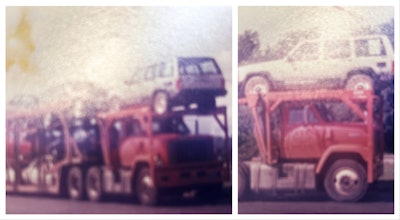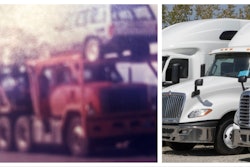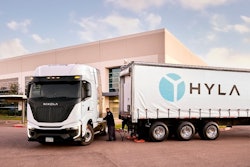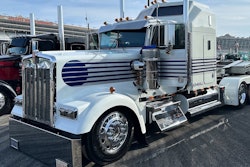Glenn Helmly retired from over-the-road work in December of 2022 in favor of a local job as urinary drug screen tech with a private company doing testing work for the DUI courts in his area in Georgia. He spent his final years OTR with Tribe Express out of Gainesville, Georgia, teaming as a company driver first with his son and then with a friend.
He got his start trucking in 2005 after his daughter "announced she wanted to be a nurse," he said. He was a paramedic at the time, and his wife managed a dealership. He thought, "How are we gonna pay for that?" He had a friend in trucking, an owner-operator leased to Schneider with a dedicated run with Georgia-Pacific, who was doing quite well. Plus: "I always had my eye on trucking," Helmly added.
He would train with Schneider in their Charlotte, North Carolina, facility, then got this CDL and "went out on the road with a trainer," staying with the company the next several years, he said, hauling regionally. Then his personal life took a turn with a divorce, and "I wanted to do something a little bit different." He thought to really get out and see what Lower 48 in total had to offer. Another trucking buddy convinced him of the positives of truck ownership, then, when he got his one and only experience with a motor carrier's lease-purchase program.

The lease was with a large carrier, the truck a 2010 royal blue Freightliner Cascadia tractor, nearly brand-new, with what he recalls as a $1,275 weekly lease payment in a five-year contract with a purchase option at the end. The story of the outcome of Helmly's experience in that carrier's lease-purchase program is emblematic of others heard by the Federal Motor Carrier Safety Administration Truck Leasing Task Force during efforts to produce its final report to Congress. The report's central recommendation was for Congress to abolish carrier lease-purchase programs administered by the carriers themselves or affiliated companies.
Helmly said he feels that's a step too far, but he agrees with various parts of the task force's recommendations, too. "Should carriers be banned from doing it?" he asked. "No, I don’t think so." Yet "I absolutely believe that major changes need to be made."
Helmly feels programs should be structured to enable lessees to utilize the leased truck for a different carrier "if the leasing company and lease operator no longer want to work together." In his view, the "reason so many fail is simply because the carrier wins when a driver fails. They get a truck that has been maintained to their standards, and it’s been paid for by someone else’s hard work. I think the best thing the government could do is set very specific rules and regulations."
 Glenn Helmly
Glenn Helmly
Both men's experiences, though more than two decades apart, illustrate how important personal circumstance, and timing, is in any truck-acquisition decision, creating the conditions for success -- or failure.
[Related: Carriers' lease-purchase programs 'meaningful' for at least half of lessee operators]
Two lease-purchase outcomes: Truck ownership, swift exit
In Helmly's case, with the U.S. economy struggling to emerge from the Great Recession, he'd done the math, and well knew that $1,275 weekly over five years would be a cash outlay for the 2010 truck that was more than double the sticker price. (Helmly's relying on memory with the $1,275 figure -- he searched for documents from the time to confirm his memory but couldn't find them now more than a decade later.)
In Overdrive's most-recent equipment-related survey, new-truck buyers reported paying roughly $140K for a new tractor at the time. If a prospective owner with no down payment or trade to bring to a purchase could ink a financing arrangement for the entire amount (an unlikely prospect in most cases), even a very-high 20% interest rate on a $140K loan over five years comes in more than $100K less expensive than the lump sum of those 260 lease payments.
Helmly, though, was determined to just give it a shot given his situation at the time. "I didn’t look at any other options," he said, "simply because I was just out of a divorce and I knew my credit wouldn’t have taken it."
Helmly's friend had been in the same lease program with Swift for about a year, and at that point was singing its praises, to an extent. "It was something I wanted to do" fundamentally, said Helmly. "Being I was then single, I could make my life the road until I got the truck paid off, or at least got a few thousand in the bank, so to speak."
The company was up-front in its contract terms, spelling everything out, Helmly said. He felt the carrier was "taking a chance on me, and so I figured there was a price to pay," likening high payments to "second-chance financing on a car."
Yet getting up to speed with adequate miles to profit considerably was the wild card.
His exit from the program came swiftly, after a short 14 weeks and three days, he said, during which time he profited $1,250 after all payments and deductions. Helmly generated revenue barely sufficient to "make my truck payment and pay for fuel. I had child-support payments. I was on the road all the time, and didn't have a place of my own. I took very little time off, versus when I'd been a company driver."
His child-support obligation effectively wiped the income out. "I was literally borrowing money just to eat and wash clothes" for some of the time, he said. Helmly's trucking friend in the program was in a very different situation. "He had a wife making money," Helmly added, yet also got out of his leased truck a few months after Helmly, perhaps illustrating the difficult environment of the time.
[Related: One man, one truck, one rebuild, one grainy photo mark 4 million safe miles in the rear-view]
For Steven Berube, his first run at truck ownership came in 1985, when he entered the lease-purchase program of Kenosha Auto Transport after responding to an ad "that was very intriguing," he said. Berube was working in the household moving business at the time, looking to get out of it, and the work advertised would be a "home-every-night job" in his native New York, running out of Albany. Two months of auto-transport training there, $1,200 for the trailer tires, and the deal "wouldn't count against my credit," he said. He felt he "had nothing to lose" and made the jump
Contract terms were more or less clear, though "I didn’t really get to see the truck beforehand," he said. After the training in Albany, he had to travel to Kenosha, Wisconsin, to company headquarters, where he learned he'd be leasing an old Yellow Freight truck painted orange and with "half a million miles on it. I said, 'What the hell'" and jumped into the 1979 GMC Brigadier daycab car hauler pictured in old shots below, and got to work.
 The 1979 GMC Brigadier was powered by a Detroit engine with a 10-speed transmission.Steven Berube
The 1979 GMC Brigadier was powered by a Detroit engine with a 10-speed transmission.Steven Berube
It was tough adjustment period in the new operation, Berube said, and the truck's "engine went" during the subsequent period, costing him six weeks' worth of downtime.
"Carriers who build their fleets by offloading payments and maintenance on aspirational owners without any real income upside for the operator, or who profit through otherwise dishonest practices..., need increased scrutiny." --Overdrive contributor Clifford Petersen, in this story detailing his lease-purchase experiences through the years
Another thing "they hid from me," he said of the company. "They had one terminal that was all company trucks in Buffalo," New York, out of which "rates were 50% better than the rest of us. I thought the guys were exaggerating for me, until I pulled a load out of there."
Sporadic freight at times, too, made things difficult initially, similar to Helmly's experience two and a half decades later. Nobody told Berube about extended time off in the summer as auto plants retooled, either.
Berube was out roughly $20,000 for the rig over three years' worth of lease payments. But as time went on, the work itself "got easier and easier and better and better, and I was making decent money for the time," even after the carrier lost a big contract in Albany, necessitating a move for Berube to running out of Baltimore, Maryland. Kenosha Auto Transport then sold out to another company, who renegged on the prior fleet's practice of paying its lease operators' tolls.
Berube was nearing the end his lease term, with about three payments left on the truck, so he bought the rest of the contract out, took ownership of the truck, and moved on to "local deliveries off the railroad" for a few months, then "hauling frozen foods with it" before the "engine went the second time," he said.
He put his house up for collateral and bought a 1982 GMC Astro, this time conventionally financing the approximately $12,500 purchase. The reduced financing cost, and a big reduction in maintenance outlays, compared to the lease, translated to much better profits. "I got a huge raise immediately," he said.
He would go on to buy another truck (a 1989 International cabover) some years later, leased to a moving company hauling trade shows and in support of concert tours and the like. Berube might well have continued through the years as a business owner but for a herniated disc that, in 1995, sparked the end of his owner-operator career. "I sold my truck," he said, and "it was a couple-three years before I could drive again."
For most of the last 30 he's been pulling mostly locally in various roles, and looks back on that time car hauling and that first, at least somewhat successful lease-purchase wistfully, to an extent. There was "good money in that car hauling," he said. "I could see the light at the end of the tunnel" before Kenosha lost the contract working out of Albany.
Had they not, "it might have worked out for all of us," he said.
As for Glenn Helmly, after he broke the lease, he turned his situation around in fairly short order by going "back to working for a company," he said. "I started focusing more on trying to be at home, and rebuilding my life. Two years out of a divorce, I wanted to establish myself. I took a local job as a safety manager." He stayed in and around trucking in various roles up through 2022. Along the way, "I bought a home, and life turned around."
He enjoyed his last few years OTR, "during the height of the pandemic," he said. "I was making $2,350 a week as a team driver," taking time to enjoy life, too. Sometimes, the freight allowed for it. "We would pick up Viagra in San Francisco -- four pallets -- and they’d give us five days to get to New Jersey. They didn’t want us early."
Read next: "What to do with the lease-purchase bad apples," Overdrive Extra contributor Clifford Petersen's lease-purchase experiences, with just two of a total nine he calls a success.











